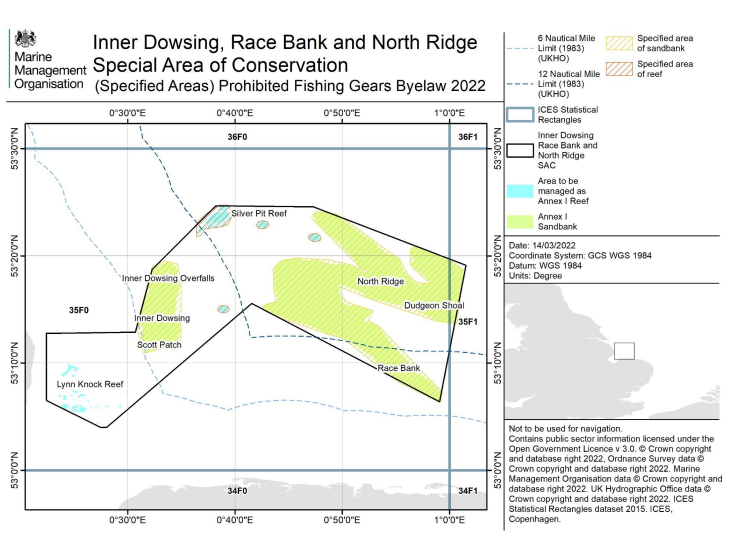March 2023
As a new Government target aims to restore protected features in Marine Protected Areas (MPAs) and vital measures are put in place to achieve this, it's become clear there’s still a long way to go in securing the gold standard of protection these sites need to recover.
Protected features are rare or vulnerable marine habitats and species such as UK cold-water coral reefs and fan mussels (see JNCC’s explainer for more information). Currently, in our degraded seas, only 44% of these features have been assessed as being in a favourable condition. The new legally binding target requires that this is increased to at least 70% by the end of 2042. To deliver this dramatic improvement clearly requires sustained action to tackle the main threat to marine life; intensive fisheries.
When introducing the targets in Parliament earlier this year, Minister Lord Benyon set out a plan to do just this. He explained that “to achieve the target, the Marine Management Organisation (MMO) and the Association of Inshore Fisheries and Conservation Authorities are rolling out an ambitious programme to introduce necessary management measures in MPAs for the most damaging fishing activity, such as bottom trawling, by 2024.”
The programmes being developed over the next couple of years will therefore be vital in how our marine life fares over the next couple of decades. It’s for this reason that we’re concerned that the current MMO programme to protect offshore MPAs from damaging fishing doesn’t go far enough in tackling the scale of the challenge. We have four main concerns that Ministers and officials must address as this important initiative advances:
- The Whole Site Approach. A central concern is that large parts of MPAs will remain unprotected; meaning that they’re still effectively ‘paper parks’. While the public expectation of an MPA is that it fully restricts activities like bottom trawling, Ministers continue to push back on protecting the whole site, arguing that “only fishing activities which could damage the protected features of an MPA require management”. This approach fails to recognise that many species are not limited to the exact location of the mapped features of a site and their health depends on the state of wider marine habitats and species across an MPA. Because in many MPAs the protected features don’t cover anything like the entire area of the site, only restricting activities on the features can hinder widespread recovery. The problem is clear in a byelaw implemented by the MMO in June last year, see bottom of page, where the protected features in green and turquoise cover less than half of the MPA, allowing potentially damaging fishing in the majority of the site. The most effective way to protect MPAs is to deliver a 'Whole Site Approach' which closes the full area of a site to damaging fishing; it's vital that this is adopted for the current MMO programme.
- Monitoring and management. Management and enforcement bodies need greater resources to deliver their work. Ministers’ commitments to marine recovery and 30x30 cannot be delivered on the cheap, as an effective system requires spending on fly overs in monitoring planes, boats, visual observations, and onshore analysts to assess the data and undertake enforcement action. Crucially, we also need to see mandatory Remote Electronic Monitoring (REM) with cameras on vessels which has been shown to be a cost-effective way to ensure compliance with the rules and improve data collection.
- Displacement of activity. The MMO have accepted that their programme of action across MPAs could “lead to displacement of fishing activities to sensitive habitats elsewhere in English seas”. If fishing activity simply intensifies outside MPAs, we’re concerned about the harm to wildlife through bycatch (the accidental death of marine life from fisheries) and the threat this poses to the achievement of Good Environmental Status across our seas. This is against a backdrop of increasing demand for use of the sea, most notably with the Government’s welcome target to deliver 50GW of offshore wind by 2030. There is no clear plan for managing current and future activities across our seas and these byelaws cannot be implemented in isolation if they are to contribute to the recovery of our marine biodiversity.
- Bycatch. The MMO are collecting evidence on the damaging impact of gill net and static pots and trap fishing, all of which are known to cause high levels of bycatch. However, because many MPAs do not list species such as harbour porpoise or dolphins as protected features, animals caught as bycatch aren’t being directly protected. The harm from bycatch, and the impact this will have on the wider marine environment, must be more clearly acknowledged by policy makers. Research over the last decade has shown that the presence of animals such as whales and dolphins is key to the functioning of healthy marine ecosystems. So the MPA network must protect wildlife from bycatch to secure a flourishing marine environment.
Although 40% of English waters are designated as Marine Protected Areas, only a maximum of 8% of English seas are effectively protected for nature according to Link’s latest analysis. It is vital that our MPAs are all providing a gold standard level of protection alongside stronger monitoring, and a plan for displacement and bycatch.
Achieving recovery of our seas requires nothing less and we hope Ministers and officials will address these concerns as welcome measures are put in place to protect the offshore MPA network up to 2024.
You can read more in Link's full response to the recent MMO consultation on managing fishing activity in offshore MPAs.
Matthew Dawson is the Marine Policy Officer at Wildlife and Countryside Link. The opinions expressed in this blog are the authors' and not necessarily those of the wider Link membership.


